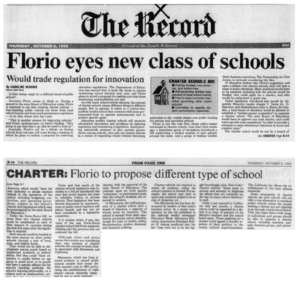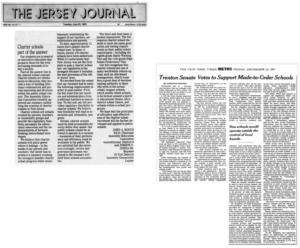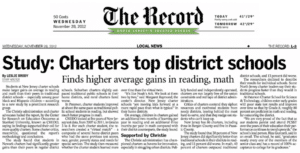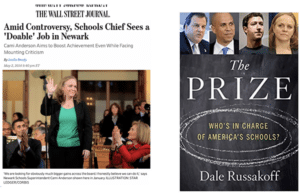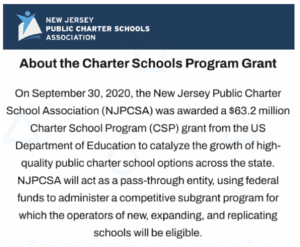New Jersey
Charter Schools Movement State Timeline
Bipartisan support led New Jersey to join a large number of states in the mid 90s to create a charter law. This catalyzed striking progress across the entire state, but especially in Newark and Camden where better educational opportunity was most needed.
Late 80’s Early 90’s
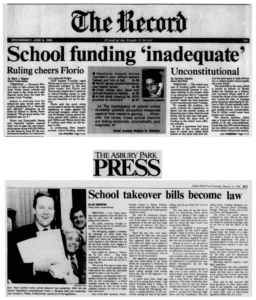
After decades of concern about the quality of public education offered to communities across New Jersey, and a school funding system that created wide disparities in funding levels between low income and more affluent areas, the state approves an aggressive state takeover plans for failing school districts, and the Abbott vs Burke Case is decided ordering the state to begin funding low-income school districts at higher levels.
1992
Democratic Governor James Florio becomes among the first governors in the nation to come out in support of the establishment of a charter school law in New Jersey, laying out his ideas at a meeting of the New Jersey State Board of Education.
1994
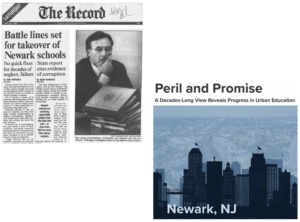
The state delivers a 1,700-page investigative report about the widespread dysfunction and poor instruction occurring within many schools in Newark. The report clears the way for the state to takeover management of the school district. The state would ultimately retain control of the district for 20 years. For more information, see “Chapter 1: The Tragedy that Preceded Chartering” in the Peril and Promise Exhibit within the Founders Library.
https://www.newspapers.com/image/497162601/
https://charterlibrary.org/newark-chapter-1-the-tragedy-that-preceded-chartering/
1993 -1995
New Jersey educators Norman Atkins and Gloria Bonilla-Santiago begin researching the charter school concept in other states and begin advocating for a charter school law to be passed in New Jersey, a history that is captured in an interview recorded by the National Charter Schools Founders Library.
https://charterlibrary.org/library/interview-of-norman-atkins-and-gloria-bonilla-santiago/
1995
John Rocco, a Republican, and Joseph Doria, a Democrat, work across the aisle to pass a charter school bill in the New Jersey legislature. Despite strong initial opposition from the New Jersey Education Association and others, the legislation was strongly supported by both parties, with a final vote in the Senate garnering 25 votes in support and only 10 in opposition. The NJEA ultimately switched to support the bill in its final form. The New York Times refers to the new kind of public schools as “made-to-order schools.”
1996 - 1997

On January 11, 1996, New Jersey Governor Christine Todd Whitman signs the charter school legislation into law. The Governor, who had made support of charter schools a central message in her inaugural address in 1994, used her 1997 State of the State address to announce that 17 charter schools have been authorized to open the following fall. In the audience were James Verrilli and Gloria Santiago-Bonilla, as recounted in “Chapter 2 of Cities in Peril.”
https://www.newspapers.com/image/222769546
https://www.c-span.org/video/?77941-1/jersey-state-state-address\
https://charterlibrary.org/newark-chapter-2-a-governor-seizes-upon-a-new-idea/
Fall 1997

14 charter schools open in communities across New Jersey. Among the inaugural cohort of charter schools is LEAP Academy in Camden, and North Star Academy and Robert Treat Academy, three schools that would prove to be very successful and would grow to serve even more students in the years ahead.
1999
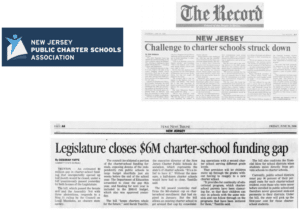
The New Jersey Charter Public Schools Association is founded, with long-time education reformer Sarah Tantillo serving as the organization’s first Executive Director. Within its first year, the advocacy organization was securing wins for charter schools, including advancing legislation reducing funding inequity and winning a court case which sought to deem charter schools disallowed under the New Jersey State Constitution.
2000

PBS airs “Charter Schools That Work,” a highly watched video essay hosted by Clarence Page documenting the successes that early charter schools were having across the United States. The first school profiled in the piece was North Star Academy Charter School in Newark, New Jersey. Meanwhile, the high profile closure of a school in Egg Harbor Township elevates the issues of accountability that arise when charter schools struggle to deliver program quality consistent with authorizer expectation.
https://www.youtube.com/watch?v=vAbfjfZr3j4
https://timesmachine.nytimes.com/timesmachine/2000/05/03/issue.html/
2002
New Jersey charter schools experience rapid expansion in response to high demand from parents. Statewide enrollment grows to exceed 12,500 students statewide. The state agrees to provide additional funding allowing charter schools to serve 2,800 more students.
2006
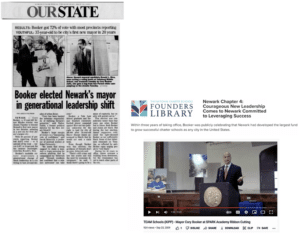
Cory Booker is elected Mayor of Newark, supporting a bold agenda for education reform. As recounted in the Founders Library Exhibit: “Cities in Peril,” within three years of taking office, Booker announces the formation of the largest fund in the nation to support the further development of high-quality charter schools in Newark.
https://www.newspapers.com/image/144436566/?terms=booker%20elected%20newark%20mayor&match=1
2009

Chris Christie is elected governor of New Jersey and makes his first post-election public appearance a visit to Robert Treat Charter School in Newark, where he highlights his commitment to charter schools and states that his administration will make aggressive education reform across the state one of its top priorities.
https://www.youtube.com/watch?v=jekcJGRnS9k&t=123s
https://www.newspapers.com/image/225014274/?terms=Newark%20charter%20school%20success&match=1
2010
Governor Chris Christie, Mayor Cory Booker and Facebook Founder Mark Zuckerberg appear on Oprah’s television show to announce a $100 million dollar contribution from Zuckerberg to catalyze improvement of education in Newark, including supporting the growth of the city’s charter school sector which was understood to be generating academic results far beyond what was being achieved by district schools. That fall, 51 applications to operate new charter schools are received by the state, the highest number seen in a decade.
2012
The Center for Research of Educational Outcomes at Stanford University (CREDO) issues a report finding that charter schools tend to outperform district counterparts in both reading and math, with outcomes showing that charter school performance with low income, African-American, and Latino students was particularly strong. The report provides validation that bold reform efforts in Newark, Camden and across the entire state are generating desired results and should be accelerated.
2014 - 2015
Newark Public Schools Superintendent proposes ”One Newark,” a comprehensive proposed reform of the city’s schools, which included plans to allow successful charter schools to access underused district facilities. The reforms spark massive resistance from the teacher union and others. Controversy around the Newark reforms becomes the focus of The Prize, a book concluding that the Zuckerberg gift had proven unsuccessful and questioning the motivation and strategies of education reformers. Cami Anderson announces her departure in the summer of 2015.
https://www.wsj.com/articles/SB10001424052702304677904579538041963133388
2017
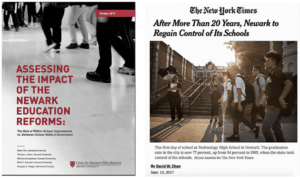
New research emerges confirming that, despite the controversy generated by reforms, academic achievement in both district schools and charter schools has increased significantly. These findings are just the latest evidence of improvement in education in Newark, leading the state to return the control of Newark public schools to the local school board.
https://www.nytimes.com/2017/09/12/nyregion/20-years-newark-schools-regain-control-baraka.html
https://cepr.harvard.edu/files/cepr/files/newark_ed_reform_report_synopsis.pdf
2017 - 2019
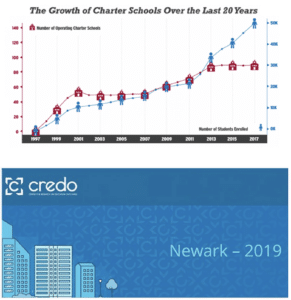
Charter school enrollment continues to grow rapidly statewide, surpassing 50,000 students in 2017. This represents a doubling in the number of students served by charter schools since 2012. Meanwhile, new research from CREDO shows that the Newark charter school sector is among the very strongest in the nation. These results were generated despite the many controversies that surrounded charter school growth in recent years.
https://www.leapacademycharter.org/wp-content/uploads/2017/05/NJCSA_StateOfTheSector2017.pdf
2020
In September, the New Jersey Public Charter Schools Association is a named the recipient of a $63.2 million grant to expand high quality charter schools in the state, the largest such grant to date having been granted to a state support organization of charter schools.
2022
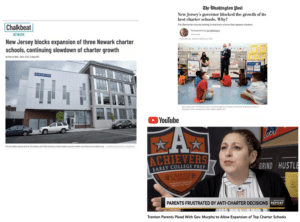
In February, the state denies the majority of charter school expansion applications, including several coming from among the highest performing charter schools in the state. The rejections spark criticism from parents, many of whom have no other quality option for their students, and from prominent national observers.
https://newark.chalkbeat.org/2022/2/9/22925671/new-jersey-charter-school-expansion-denied-newark
https://www.washingtonpost.com/education/2022/02/20/new-jersey-governor-murphy-charter/
2023

In striking contrast to 2022, the state approves 11 of 14 charter school expansion requests after a months-long communications campaign and outreach from parents. Months later, CREDO issues its third national report wherein it finds that students in New Jersey charter schools experience an additional 33 days of learning per year in reading and 32 days in math, compared to their counterparts in traditional public schools. These results place New Jersey charter schools among the highest performing state sectors in the country.
https://njedreport.com/credo-says-nj-students-learn-more-at-charters-than-in-district-schools/
